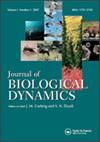Editorial.
IF 1.8
4区 数学
Q3 ECOLOGY
Journal of Biological Dynamics
Pub Date : 2021-05-01
Epub Date: 2021-05-11
DOI:10.1080/17513758.2021.1925406
引用次数: 0
Abstract
The 7th International Conference on Mathematical Modelling and Analysis of Populations in Biology (ICMA-VII) was held at Arizona State University, Tempe, Arizona, USA, on 12–14 October 2019. This conference series has been held every two years since its inception in 2007 at the University of Arizona. Previous conferences were held at the University of Arizona in Tucson, University of Alabama inHuntsville, TrinityUniversity in San Antonio, Texas, Texas TechUniversity in Lubbock, Texas, andWesternUniversity, London, Ontario. ICMAVII, which built on the successes of previous ICMA conferences, attracted established and up-and-coming researchers and students from numerous disciplines in the mathematical and biological sciences. Specifically, the conference attracted 192 participants from 10 countries. The conference featured 108 oral and poster presentations, 79 of which were delivered by graduate students, postdoctoral fellows and early-career faculty on a number of broad general themes that included the formulation, validation, analysis and simulation of mathematical models for the spatiotemporal dynamics of biological populations. Specific topics covered included modelling, data analytics and analysis of phenomena in population biology, epidemiology, molecular and synthetic biology; mathematical oncology (cancer systems biology); genetic models; multi-host-vector-pathogen systems; persistence of ecosystems andmathematics of gene editing. The Plenary speakers at ICMA VII were Dr Natalia Komarova (Department of Mathematics, University of California, Irvine), DrQingNie (Department ofMathematics and Center forMathematical and Computational Biology, University of California, Irvine), Dr Sebastian Schreiber (Department of Evolution and Ecology, University of California, Davis) and Dr HaoWang (Department of Mathematics, University of Alberta, Canada). The conference featured a plenary lecture by the winners of the Lord Robert May Prize for the Best Paper Published in the Journal of Biological Dynamics 2017-2018. The prize was given to Drs Brian P. Yurk (Department of Mathematics, Hope College, MI, USA) and Christina A. Cobbold (School of Mathematics and Statistics, University of Glasgow, UK) for their paper titled "Homogenization techniques for population dynamics in strongly heterogeneous landscapes”. We are very grateful to the members of the Local Organizing Committee and the Scientific Advisory Committee for their invaluable contributions to the success of ICMA-VII. We are especially very grateful to Professors JamesM. Cushing (University of Arizona) and Saber N. Elaydi (Trinity University) for their tireless contributions and support throughout the whole process of planning, fund-raising and running the conference, as well as in helping us edit this special issue.社论。
本文章由计算机程序翻译,如有差异,请以英文原文为准。
求助全文
约1分钟内获得全文
求助全文
来源期刊

Journal of Biological Dynamics
ECOLOGY-MATHEMATICAL & COMPUTATIONAL BIOLOGY
CiteScore
4.90
自引率
3.60%
发文量
28
审稿时长
33 weeks
期刊介绍:
Journal of Biological Dynamics, an open access journal, publishes state of the art papers dealing with the analysis of dynamic models that arise from biological processes. The Journal focuses on dynamic phenomena at scales ranging from the level of individual organisms to that of populations, communities, and ecosystems in the fields of ecology and evolutionary biology, population dynamics, epidemiology, immunology, neuroscience, environmental science, and animal behavior. Papers in other areas are acceptable at the editors’ discretion. In addition to papers that analyze original mathematical models and develop new theories and analytic methods, the Journal welcomes papers that connect mathematical modeling and analysis to experimental and observational data. The Journal also publishes short notes, expository and review articles, book reviews and a section on open problems.
 求助内容:
求助内容: 应助结果提醒方式:
应助结果提醒方式:


